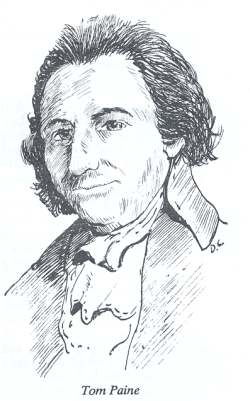 |
|
| Issue #19 • January/February, 1993 |
Many years ago, before I came to my senses and left public education for good, I was teaching on a college campus when one of the administrators approached me and asked the topic of my lecture that day.

“Tom Paine and the Rights of Man,” I told him.
The administrator sneered, managed a look of utter contempt, and asked, “Do you mean to tell me that you are still defiling the minds of our students with the lightweight works of that filthy little atheist?”
Thinking of Rousseau’s comment that the Holy Roman Empire was an appropriate title except that it was neither holy, nor Roman, nor an empire, I responded, “Your description of Paine is correct except that he was not lightweight, little, filthy, nor an atheist.”
I went on to add that Tom Paine was, according to no less an authority than George Washington, the man who single- handedly did more to help win the American Revolution than any other person on this continent.
“He was also,” I said, “for better or worse, the man who started the Bank of North America, invented the metal suspension bridge, gave us the idea for a selective service draft system, suggested medicare and social security and pension retirement plans. He urged the establishment of a society for the prevention of cruelty to animals, campaigned vigorously for international copyright laws, and donated to the cause of the American Revolution the money that was earned by The Crisis, America’s first genuine best-seller in literature.”
Before my prey could escape, I added, “And, incidentally, he was the man who named this country. He was the first person to use, so far as anyone knows, the phrase, “The United States of America.”
“He was still an atheist,” the administrator added, walking away with the smug assurance of all authoritarian leaders who remain convinced that whatever they say or do has the blessings of God and the approval of the Congress.
And today, two hundred years after the appearance of the Rights of Man, on February 17, 1992, most Americans have never even heard of Tom Paine, and the few who have cannot tell you anything about him except that he was “a filthy little atheist” and enemy of Christianity whose writings defile the minds of all who read him.
To clear the air, Paine was not an atheist in any sense of the word, and it would have been perfectly all right if he had been one in every sense of the word. In point of fact, he wrote in The Age of Reason, “I believe in one God and no more, and I hope for happiness beyond this life. I believe in the equality of man, and I believe that religious duties consist in doing justice, living mercy, and endeavoring to make our fellow creature happy.”
Strange words, indeed, from a man who allegedly hated Christianity and harbored no beliefs in God!
What Tom Pain did hate, and passionately, was Big Government. He wrote, “Society in every state is a blessing, but government, even in its best state, is but a necessary evil; in its worst state, an intolerable one.”
He hated the idea of an uncontrolled welfare state and stated his feelings, clearly when he wrote, “Those who expect to reap the blessings of freedom must, like men, undergo the fatigue of supporting it.” When American troops were being soundly defeated on nearly all fronts during the American Revolution, Paine, who was serving without pay as aid-de-camp to Nathanael Greene, became impatient with the complaints of the soldiers who did not win the war as easily as they had hoped.
And Tom Paine then wrote some of the most memorable lines in the history of the English language: “These are the times that try men’s souls. The summer soldier and the sunshine patriot will, in this crisis, shrink from the service of their country; but he that stands is now, deserves the love and thanks of man and woman. Tyranny, like hell, is not easily conquered; yet, we have this consolation with us, that the harder the conflict, the more glorious the triumph. What we obtain too cheap, we esteem too lightly….Heaven knows how to put a proper price upon its good; and it would be strange indeed if so celestial an article as Freedom should not be highly rated.”
Paine describes a prosperous American businessman who held a child by the hand and, after expounding on his reasons not to fight for this nation and its freedom, concluded by saying, “Give me peace in my day.”
Paine fairly bristled with anger as he retaliated. “Not a man lives on the continent but fully believes that a separation (of American from England) must some time or other take place, and a generous parent should have said, “‘If there must be war, let it be in my day, that my child may have peace.'”
Amen, and amen!
On the topic of religion, he insisted that he did not believe in the creed espoused by any church that he knew of. “My own mind is my own church,” he wrote, and later he established a brick and mortar church of his own, the Theophilanthropic Church, whose major creed was that the greatest religious faith is that of good works to our fellow creatures. He disliked organized religion and held firmly to the faith that the right not to embrace an organized church is at least as sacred as the right to attend the church of one’s choice.
“All national institutions of churches,” he wrote, “appear to me no other than human inventions set up to terrify and enslave mankind and monopolize power and profit.
Jim Bakker should be thankful that Paine is not alive today. Tom would attack the televangelists in their own pulpits.
At the same time he denounced national religious organizations, he modified his position by saying that he did not condemn those who disagreed with him: “They have the same right to their belief as I have to mine. But it is necessary to the happiness of man that he be mentally faithful to himself. Infidelity does not consist in believing or disbelieving; it consists in profession to believe what he does not believe.”
In his Rights of Man Paine set forth the arguments that civil rights are merely an extension of the natural rights of man as they existed in pre-governmental status. He argued that these natural rights include the maximum freedom compatible with the rights of others and that civil government should not interfere with the freedom of man except to insure and protect the happiness of the majority of the people. Not long after his declarations of human rights, Paine was arrested and sentenced to die for his role in the French Revolution. In a bizarre turn of events, he was spared because of chronic diarrhea.
His jail cell door was marked with a charcoal X so the executioner would know whom to behead the following day, and Paine’s cell smelled so bad that the door was left open and the X was turned to the wall and Paine was spared until Jefferson and other friends could help him escape to America.
Then, in the land he named and helped to free, he was denounced by ministers as an atheist (and still is denounced by college administrators who would do their jobs if they knew how) and died in disgrace. He was buried on his farm in New Rochelle, New York, but enemies continued to denounce him until finally he was exhumed and his bones were taken to England. A friend at the exhumation snapped off the final joint of the little finger of Paine’s right hand and slipped the bone back in the grave so that some part of Paine would remain on American soil. The remainder of his remains were sold as souvenirs, made into pipe bowls and paperweights, and eventually lost.
And today, exactly two hundred years after Paine published his Rights of Man, he is among the most neglected writers and thinkers of the Revolutionary period. High school history books, if they mention Paine at all, award him a vague mention of a propagandist. Preachers continue to vilify him, and everyone else neglects him totally.
Only a few hack writers (like me) who admire and appreciate Paine’s mastery of the English language and his dedication to the cause of individual freedom of thought and actions scribble articles like this to remind others that if it had not been for Tom Paine, America as we know her today might never have existed.
So, thanks, Tom, two hundred years late but from the bottoms of our hearts and the depths of our souls, for making us free and inspiring us to try to stay that way.















Excellent article! We’ll done. Many in our country should read Paine’s writings.
Bravo! I appreciate your sharing of such knowledge and timeless wisdom!
Definitely looking deeper into this man. I have to admit that I don’t know a lot about him but thank you for this article. I will be learning more. I think he’s my kind of guy!